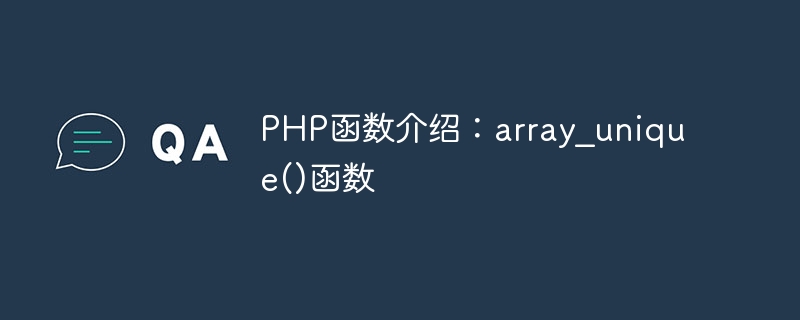

Introduction to PHP functions: array_unique() function, specific code examples are required
In PHP programming, we often need to operate and process arrays. One of the commonly used functions is the array_unique() function, which allows us to remove duplicate elements from an array and return a new array.
The syntax of the array_unique() function is as follows:
array_unique(array $array, int $sort_flag = SORT_STRING): array
Parameter explanation:
Let’s look at a specific example to learn more about how to use the array_unique() function.
//Define an array containing repeated elements
$fruits = array("apple", "banana", "orange", "apple", "melon", "banana");
// Use the array_unique() function to remove duplicate elements
$uniqueFruits = array_unique($fruits);
//Print out the array after deduplication
print_r($uniqueFruits);
?>
In the above code snippet, we define an array $fruits containing repeated elements. Then, we use the array_unique() function to deduplicate the array $fruits, and assign the deduplicated array to the $uniqueFruits variable. Finally, we print out the deduplicated array through the print_r() function.
Run the above code, the output result is as follows:
Array
(
[0] => apple [1] => banana [2] => orange [4] => melon
)
You can see that in the deduplicated array, the duplicate Only one of the elements "apple" and "banana" is retained, while the other elements remain unchanged.
When using the array_unique() function, there is an optional parameter $sort_flag, which is used to specify the way to sort the array elements. It has the following two values:
The following example demonstrates how to use the $sort_flag parameter:
$numbers = array(1, 3, 5, 2, 5, 4) ;
// Use the array_unique() function to remove duplicate elements and sort them in dictionary order
$uniqueNumbers = array_unique($numbers, SORT_STRING);
// Print output after deduplication Array
print_r($uniqueNumbers);
?>
Run the above code, the output result is as follows:
Array
(
[0] => 1 [1] => 2 [2] => 3 [4] => 4 [5] => 5
)
You can see that by specifying $sort_flag as SORT_STRING, the array elements are treated as strings and sorted in dictionary order. The final output deduplicated array is arranged in ascending order.
Summary:
The array_unique() function is a very convenient function in PHP, which allows us to quickly remove duplicate elements from an array. By specifying the $sort_flag parameter, we can also deduplicate array elements according to different sorting methods. In actual development, using the array_unique() function can greatly simplify the processing and operation of arrays and improve the efficiency of the code.
I hope the above introduction and sample code about the array_unique() function can help you. By learning and using this function, you can better process arrays.
The above is the detailed content of PHP function introduction: array_unique() function. For more information, please follow other related articles on the PHP Chinese website!
 Will the Bitcoin inscription disappear?
Will the Bitcoin inscription disappear? css3 gradient properties
css3 gradient properties How to use insert statement in mysql
How to use insert statement in mysql A complete list of linux server operation and maintenance commands
A complete list of linux server operation and maintenance commands How to convert html to txt text format
How to convert html to txt text format Implementation method of js barrage function
Implementation method of js barrage function How to solve the problem of failure to load dll
How to solve the problem of failure to load dll Wireless network card cannot connect
Wireless network card cannot connect



